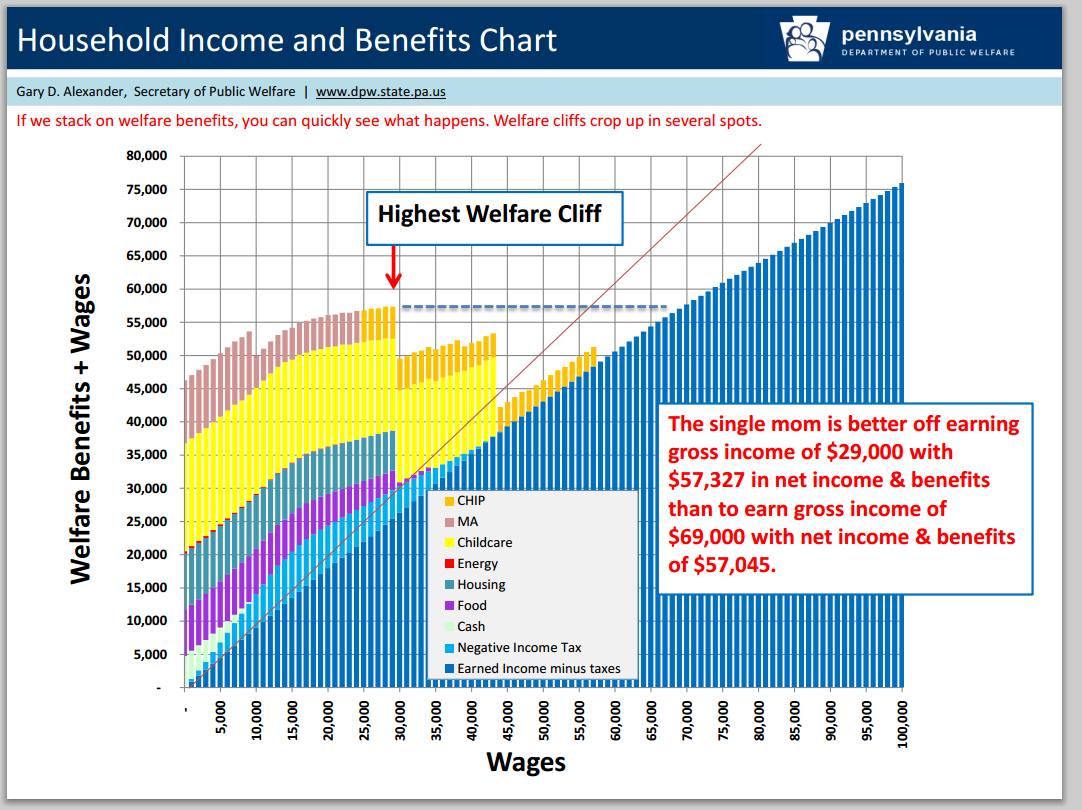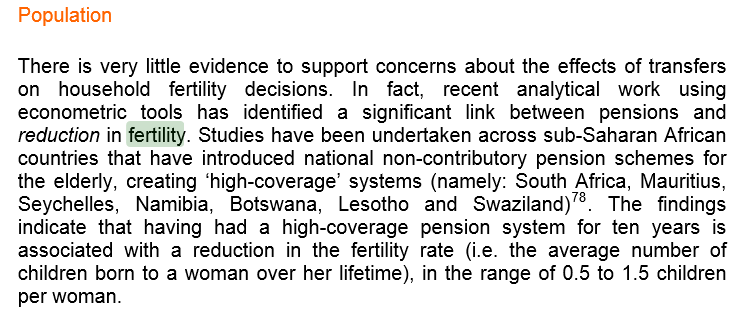Will Replacing Current Benefits With Cash Tomorrow Leave Today's Recipients Better or Worse Off?
Here's an article I wrote that looks at our current welfare system.
In that article is the following image from this presentation:

This image depicts a single parent with two children living in Pennsylvania. Basic income should replace her cash, food, housing, and energy benefits, and not her childcare, Medicaid, and CHIP benefits. Those would be better replaced with universal programs other than universal basic income.
Case $0: A single parent with two kids and no labor market income currently receives $20,000 from all of these cash replaceable benefits. With a $12k/4k UBI ($12k for adults and $4k for kids), a parent would receive $20,000 in UBI.
So this person with no job would see no change. She is no better off and she is no worse off. Basic income is only meant to replace her current benefits with cash instead.
So what if she was earning some level of income? If earning income leaves her worse off, this would mean basic income would provide a disincentive to work. Whereas if with basic income she is better off, then basic income will provide a better incentive to work.
Case $5,000: If she earned $5,000 in income, her income plus benefits now would be $24,000. With UBI (assuming her incomes tax rates remain unchanged) her total income would be $25,000.
She would be better off with basic income.
Case $10,000: If she earned $10,000 in income her income plus benefits would be $28,000. With UBI her total income would be $30,000.
She would be better off with basic income.
Case $20,000: If she earned $20,000 in income her income plus benefits would be $36,000. With UBI her total income would be $40,000.
She would be better off with basic income.
So as she earns more income, she keeps doing a bit better compared to now, that is until the present welfare cliffs rear their ugly heads. Then she does a LOT better with UBI.
Case $30,000: The big change happens at $30,000 where right now because of a giant welfare cliff she loses almost $10,000 in benefits for working and her total would only be $31,000 whereas with a UBI it would instead be $50,000.
She would be WAY better off with basic income.
Case $45,000: When she earns $45,000 she currently loses all the benefits UBI looks to replace after being deemed as no longer needing any of them and walks away after taxes with $38,000. With a UBI she'd walk with $58,000.
She would be better off with basic income.
Again, the above cases assume unchanged tax rates, and realistically tax rates will need to go up, although it all depends on how the UBI is funded. If funded with a flat income tax, as she works she might be slightly worse off than she could otherwise be with a basic income. But she would still be no worse off than she is now.
For example, at $10,000 she's getting $28,000 but if her income is taxed at a flat 40%, she's going to lose an extra $2,000 or so income tax and have $28,000 instead of $30,000. So she'll no longer come out $2,000 ahead but she still won't be worse off. She'll just walk away with the same $28,000 she does now.
Meanwhile, a UBI funded with a land value tax instead would let her stay $2,000 ahead and might even reduce her rent through providing the incentive to make available for rent vacant homes and undeveloped lots, increasing the supply of housing and therefore decreasing the price that can be charged. In this way, perhaps she could walk away $3,000 or $4,000 ahead instead of $2,000.
Hopefully it's more clear now how a single parent with kids can be just as well off and even better off with UBI than present benefits, and this will vary depending on how a UBI is funded. We should also remember how much more time she will have not being forced to jump through welfare hoops, and also what that means for her sense of worth and ability to earn more income or spend more time with her kids.
This should also make clear how important it is to provide the partial additional amount for kids. There are those who don't like this idea, even some basic income supporters, but without that added amount for kids, many if not most parents receiving benefits now will be worse off with basic income because all current benefits provide more benefits based on number of kids. This is how it's done all over the world. Larger households get more benefits. And no, this doesn't provide a massive incentive for pumping out babies for cash. In fact, there is the case to be made for it decreasing fertility rates because this is all so tied into poverty and inequality.
An evidence paper on cash transfers by the Department of International Development found their effects on population to be the following:

This long-term decrease in fertility might be of interest to those who want it to decrease.
All of the above has focused on a single parent with kids because they are the ones right now receiving the most aid. Understanding that, those without kids will definitely be better off with UBI because right now people without kids get relatively little help in comparison to those with kids.
Individuals without kids will be better off with basic income.
Also, as soon as we're talking about couples instead of singles, UBI again makes a drastic improvement on the current system because of each getting UBI.
Two-adult households with and without kids will be better off with basic income.
We will all be better off with basic income.
The only way we can be worse off with basic income, is if we attempt to replace benefits like health care and child care with cash. These programs should remain separate and require their own improvements separate from basic income.

Did you enjoy reading this? Please click the subscribe button and also consider making a monthly pledge in support of my daily advocacy of basic income for all.
_large.jpg)
UBI Guide Newsletter
Join the newsletter to receive the latest updates in your inbox.
